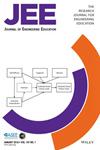Making facilitates an engineering student's identity work in becoming an engineer
Abstract
Background
Many students bring rich experiences and identities related to making activities into undergraduate engineering programs. However, the dominant technocentric narratives in engineering dictate which forms of making are legitimized in engineering practices, marginalizing students whose identities do not align with the canonical norms of engineering.
Purpose
This study characterizes the identity processes of students with rich experiences related to making as they navigate institutional cultures. It offers insights into how engineering programs can better support students' identity work through making.
Design
The study uses narrative inquiry to construct a case study of the engagement of an engineering student, Sarah, in an undergraduate course focused on exploring the relationships between making and engineering. The analysis closely examines Sarah's identity work throughout the course and investigates how the course supported the process.
Results
Sarah experienced tensions when navigating the institutionalized narratives of the engineering program, which led her to doubt the legitimacy of her past making experiences as valuable for her participation. Through her identity work negotiating the tensions she experienced, she resisted assimilating with those narratives, recognized her past making experiences as assets for engineering learning, and repositioned herself as a legitimate member of the program.
Conclusions
Understanding the tensions undergraduate students experience between their past making experiences and the institutionalized narratives of engineering programs can help educators and researchers to better understand their identity processes. Supporting students in viewing their past making experiences as assets for engineering learning can facilitate their identity work to legitimize their participation in engineering.

 求助内容:
求助内容: 应助结果提醒方式:
应助结果提醒方式:


